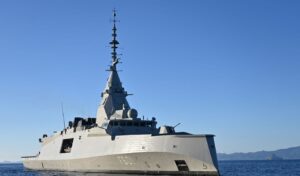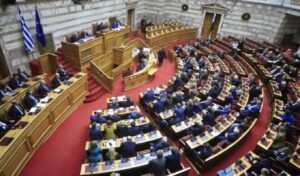The contacts on the sidelines of the UN General Assembly in New York, the sudden cancellation of the Mitsotakis – Erdogan meeting, and Donald Trump’s tête-à-tête with the Turkish president left behind strong political messages. As experts assess, one thing is certain for the future of Greek-Turkish relations: the period of “calm” is over and the responsibility lies with Ankara. Meanwhile, Athens continues its path of defense, energy and geopolitical strengthening, without ruling out dialogue.
The reasons for the cancellation of the Mitsotakis – Erdogan meeting
In recent days, much has been written about Tayyip Erdogan’s decision –because it was clearly a choice– to postpone his meeting with the Greek Prime Minister just four hours before the scheduled appointment. Officially, the Turkish side cited the president’s extremely packed schedule. According to the plan, at 09:00 he would see Kyriakos Mitsotakis for about 20 minutes of clear time, since at 09:30 he had to participate in the Gaza session convened by Donald Trump with leaders of Arab and Muslim countries. However, according to reliable information from “Sunday Afternoon,” the Turkish side knew about the problem since Monday afternoon and could have requested a change in time. They didn’t, which leads diplomatic sources to speak of a pretext. As they point out, in reality Turkey would have had more to gain from a handshake with the Greek Prime Minister – mainly the image to the West that it talks to all neighbors and NATO member states.
What diplomatic circles say
However, excellently informed diplomatic circles told “Sunday Afternoon” that none of the other scenarios heard in recent days hold water. Specifically, it was said that Turkey was annoyed because Greece rushed to announce the meeting. “We always announce our meetings a priori, unlike our neighbors. The meeting was scheduled and excellently organized,” they insisted from Athens.
The other scenario, which those in the know reject as a version, relates to the alleged leak of the agenda (lifting the casus belli as a precondition for Turkey’s participation in SAFE otherwise veto, Libya, energy, cable etc.). It is customary, before every Greek-Turkish contact, for the press to publish the prevailing issues to be discussed. The same happened now. Why weren’t the Turks bothered in the past and were bothered this time? The same diplomatic circles estimate that T. Erdogan would cancel the meeting only for something that displeased him.
However, Kyriakos Mitsotakis stated on Friday from the UN podium that: “The Eastern Mediterranean faces many challenges, such as migration. In every relationship with every neighbor, Greece has respect for International Law as its compass. Greece seeks peaceful coexistence with Turkey. Calm waters must allow us to find a solution for both sides. Turkey must lift the threat of war against Greece, which is a black cloud over our relations. The casus belli must be lifted,” he emphasized, sending a clear message to Turkey. Greece’s defense upgrade and the new deals being planned, the Maritime Spatial Planning, the Marine Parks, the preparation for discussion with Tripoli on the demarcation of Greek-Libyan EEZ, the insistence on constructing the cable for the electrical interconnection of Greece – Cyprus and, of course, Chevron’s arrival for hydrocarbon exploration south of Crete are moves that Turkey certainly didn’t like. No one can guess which of these surprised and, consequently, angered T. Erdogan. Possibly he didn’t expect Greece to proceed. He was “keeping it for us.”
As the Prime Minister told the Wall Street Journal: “If sometimes what we do causes some discomfort in Turkey, so be it. C’est la vie, as the French would say.”
How they “read” the Erdogan – Trump meeting
Apart from the diplomatic impropriety of New York, T. Erdogan attempted to “elevate” himself by also showcasing his relationship with D. Trump. The truth is that the “planetary ruler” praised the role Turkey plays in certain critical issues for the US (Syria, Gaza etc.), while during the meeting of the two presidents at the White House, agreements were also signed for the purchase of 225 Boeing aircraft by Turkish Airlines, deals for liquefied natural gas (LNG), while a Strategic Cooperation Memorandum in the field of Civil Nuclear Energy was also signed.
From Athens they commented to “Sunday A” that a Turkey within NATO is better than a Turkey “outside.” Meaning it is in the interest of all Alliance members for the neighbor to be in the spirit of the Alliance and tied to the Western chariot. Regarding the F-35s that Turkey desperately wants, the same voices told our newspaper that the road is very long and difficult for Ankara. Everything wasn’t resolved on Thursday in Washington. For Turkey to get the fifth-generation fighters, it must overcome four stages. First, it must decouple from Russian energy, which cannot happen overnight.
Second, it must resolve the issue of Russian S-400s. Third, a green light from Congress is required and, finally, Israel must also accept it, whose relations with Turkey are at their nadir. Tel Aviv says again and again that it doesn’t want to border a “hostile” power that also has F-35s in its arsenal.
High-level contacts and Mitsotakis’ tactics
It’s worth noting that while D. Trump and R.T. Erdogan were discussing F-35s and F-16s at the White House, K. Mitsotakis was meeting with the president of Lockheed Martin, the manufacturer of the F-35s that Greece will procure. While a few hours earlier, the Prime Minister had an introductory meeting with Kimberly Guilfoyle.
The lifting of sanctions under the CAATSA law, which T. Erdogan hopes for to get the F-35s, also featured in the letter sent by congressmen to the US Secretaries of State and Defense, shortly before the D. Trump – T. Erdogan meeting at the White House. Chris Pappas, Gus Bilirakis, Dina Titus and Nicole Malliotakis, co-chairs and vice-chairs of the Hellenic Caucus, led a bipartisan group of their colleagues in a letter to Marco Rubio and Pete Hegseth. The legislators explained that they oppose the sale of F-16 and F-35 fighter aircraft to Turkey due to its possession of Russian S-400 missile systems. They urge the Trump administration to respect and uphold American law before proceeding with such a sale. Emphasizing the danger to US national security, the legislators wrote: “The security risks from Turkey’s acquisition and continued possession of the Russian S-400 system are known. The S-400 poses a direct threat to US military aircraft, including both the F-16 and F-35, allowing Russian intelligence services to gain information about sensitive US military technology if operating alongside these platforms.” Of course, if Turkey gets Patriots from the US, it practically won’t need the S-400s. Such a change, however, would displease Vladimir Putin. Therefore, there are no easy solutions for Ankara.
The air balance tilts in favor of our country
However things develop around the F-35s, whatever “compensation” the other side gives (see Theological School of Halki), the air balance tilts in favor of Greece. Our country “responds” to T. Erdogan’s actions in the US with enviable defense steps, whose progress “Sunday A” reveals today.
- F-35. While the Turks are in the… waiting room, the Greek Air Force is preparing for the arrival of the first fifth-generation fighter earlier than the expected delivery year. We expected them in 2030, but according to a Lockheed Martin official, the first fighter will finally be ready around late 2028.
- F-16 Viper. The 42nd modernized F-16-Viper, in collaboration between Lockheed Martin and the Hellenic Aerospace Industry (HAI), was delivered last week. We are now at 50% of the program (84 fighter aircraft), which is proceeding normally.
- Belharra. The draft law with the contract for the 4th Belharra frigate and the upgrade of all frigates from Standard 2 to Standard 2++ is being voted on Thursday (October 2) in Parliament. Greece aims for the frigates to carry the new ELSA missiles and naturally to participate in the corresponding program. The first Belharra is expected at the end of December and the other two within 2026.
- Bergamini. The ever-active Defense Minister Nikos Dendias will travel to Italy tomorrow to sign a memorandum with his Italian counterpart Guido Crosetto regarding the start of negotiations for acquiring at least two Bergamini-type frigates. However, the possibility of 2+2 has also been raised in discussions. That is, acquiring two frigates of this specific class in the first phase and subsequently –when they are released from the Italian Navy– two additional ones. If all goes well, Greece will have 8 new-generation frigates in a few years.
- Dome. As for the anti-aircraft-anti-ballistic “blue and white” dome, based on planning it will be in operational function around late 2026.
Published in “Sunday Afternoon”




